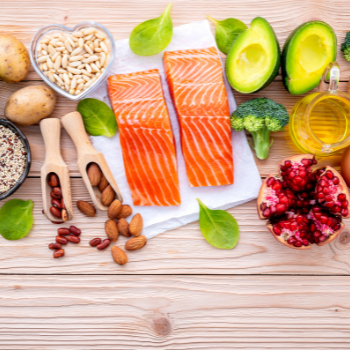How to Eat with your Brain in MIND
by: Susan Farley,
County Extension Agent,
Family and Consumer Sciences
The MIND diet takes two proven diets/eating patterns – the DASH (Dietary Approaches to Stop Hypertension) diet and the Mediterranean diet – and focuses on the foods in each diet that affect brain health. The MIND diet stands for Mediterranean-DASH Intervention for Neruodegenerative Delay. It was developed by nutritional epidemiologist, Martha Clare Morris, ScD, and her colleagues at Rush University Medical Center in Chicago.
Growing older takes a toll on the body and the mind. For example, the tissue of aging human brains sometimes develops abnormal clumps of protein deposits, known as amyloid plaques and tangles, that build up in between nerve cells and typically interfere with thinking and problem-solving skills.
Research shows that following the MIND diet could slow brain aging for more than seven years and reduce the risk of developing Alzheimer’s disease.
The MIND diet foods that are encouraged to be eaten include:
- One cup of leafy green vegetables each day
- One serving of any other vegetable each day.
- Three servings of whole grains each day. Whole grains are foods like brown rice, oats, whole-wheat pasta, and whole wheat bread.
- One glass of red wine each day. Wine contains antioxidants that help prevent plaques from forming in your brain leading to dementia. However, this is one diet change you’ll need to check with your health care provider before making, as there might be health or medication issues that would prohibit the drinking of wine or any alcoholic drink.
- One serving of dried beans about every other day. Dried beans, such as lentils, pinto, navy, and kidney.
- Two servings of berries each week. Berries are full of phytochemicals and flavonoids, which are great for your brain health, and the seeds in berries also help your digestive system stay regular. However, people with certain diseases, like diverticulosis, should follow their health care provider’s recommendations when eating berries.
- Two servings of poultry a week.
- One serving of fish each week. Focus on fatty fish, such as salmon, herring, mackerel, and sardines.
- Five servings of nuts each week. Grab a handful of unsalted, dry-roasted, or raw nuts instead of processed snacks like chips or cookies.
- Cook with mostly olive oil. Use extra virgin olive oil in place of butter or margarine.
Limit intake of:
- Butter/margarine: less than 1 pat per day
- Cheese: less than a 1-ounce serving/week
- Pastries/sweets: less than 5 servings/week
- Fast/fried food: less than 1 serving/week
- Red/processed meats: less than 4 servings/week
Following a MIND diet doesn't mean you have to give up your favorite foods; instead, it encourages a focus on adding more healthful foods to your diet and eating fewer less-healthy foods to help your brain stay healthy.
